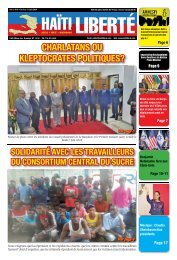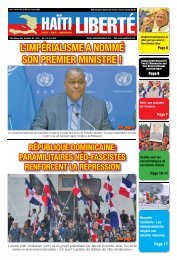Create successful ePaper yourself
Turn your PDF publications into a flip-book with our unique Google optimized e-Paper software.
This week in Haiti
How Canada Funded a “Human Rights” Group to
Help Topple Aristide
Pierre Espérance, director of
the RNDDH, played a key role
in destabilizing Jean-Bertrand
Aristide’s democratically elected
government.
by Travis Ross
(The second of two parts)
Documents obtained by The Canada
Files reveal that a Haitian “human
rights” NGO had two reports, which
it used to target political opponents,
funded indirectly by the Canadian
government through the NGO Avocats
sans Frontières Canada (ASFC).
The National Human Rights Defense
Network (RNDDH) receives an
undisclosed amount of funding under
the ASFC “Access to Justice and Fight
Against Impunity in Haiti” (AJULIH)
project for “advocacy activities.” This
author previously explained the corruption
of RNDDH and its director, Pierre
Espérance.
In 2004, the Canadian government
funded the RNDDH (then
NCHR-Haiti) as part of a broader effort
to ensure the criminalization and
violent repression of Lavalas leaders
and supporters. The RNDDH played a
key role in destabilizing Jean-Bertrand
Aristide’s democratically elected government
by fabricating allegations of
human rights abuses about Lavalas
leaders and members before and after
the 2004 coup d’etat. The RNDDH also
gets funding from the National Endowment
for Democracy (NED), described
by its co-founder Allan Weinstein as
doing “a lot of what …was done covertly
25 years ago by the CIA.”
Subsequent allegations and
reports further reinforce the view that
Espérance and the RNDDH are a political
organization - with the facade of a
human rights group - which uses their
platform and funding to target and persecute
political opponents.
ASFC funds RNDDH reports that
target Pierre Espérance’s political
opponents
ASFC funded two RNDDH reports
as part of the AJILUH project. Global
Affairs Canada confirmed it knew that
the RNDDH got funding from their project
when asked for comment.
Both reports contain a disclaimer:
“This document was produced within
the framework of the project ‘Access to
justice and fight against impunity Haiti’
implemented by Avocats sans frontières
Canada (ASFC) and its partners.
The content of this document is the sole
responsibility of the RNDDH and does
not necessarily reflect ASFC’s points of
view.”
The two reports, translated to
English, are titled “Attacks on deprived
neighborhoods: The RNDDH demands
the end of the protection of armed
gangs by the authorities in power” and
“The reign of Prime Minister Ariel HEN-
RY Or The fury of armed gangs”.
Both reports repeat RNDDH allegations
that Jimmy Cherizier is a “gang
leader” beholden to Haiti’s president
Jovenel Moïse and, after he was assassinated,
de-facto Prime Minister Ariel
Henry, both members of the Haitian Tèt
Kale Party (PHTK).
The first report is 25 pages long.
Cherizier’s name appears 52 times. The
report focuses on the alleged crimes
of Cherizier’s G-9 coalition and ignores
alleged crimes by other gangs.
The G-9 alliance regularly battled the
criminal gangs, including, at the time,
400 Mawazo and Izo’s 5 Second gang,
which are omitted from the report.
Gangs opposing the G-9 alliance
are responsible for virtually all the incidents
of kidnapping and rape in Portau-Prince.
Espérance must have been getting
nervous. The first report was
published Jun. 23, 2020. The day before,
Haitian media began reporting
on Cherizier’s successful negotiations
with several gangs in Port-au-Prince
for a cease-fire. Cherizier had united
his neighborhood defense group (or
vigilance brigade) with others in Portau-Prince.
He also claims to have successfully
convinced some criminal gang
leaders to cease illegal activity that
harmed local residents and, instead,
defend them against criminal gangs.
The coalition was named Revolutionary
Forces of the G9 Family and
Allies, AKA G9 or FRG9.
In July 2020, in response to the
G9, the criminal gangs quickly made a
federation known as “G-Pép.” These
gangs often function as paramilitary
forces for Haitian oligarchs and politicians.
Ti Gabriel of the Cité Soleil gang,
for example, had the support of Haitian
oligarch Reginald Boulos, who, in turn,
supported PM Henry’s political accord.
The first report alleges that Cherizier
is “a powerful man, feared by the
private business sector, the armed arm
of President Jovenel Moïse.”
Conversely, while speaking
about his public demand that Moïse
step down, Cherizier said the G9 wanted
him to “leave the country,” and he
praised leaders such as Aristide and
Platfòm Pitit Desalin leader Moïse
Jean-Charles.
“The G-9 is not working for the
regime, and the G-9 was not created
by and is not working for the opposition,”
Cherizier said. “It was created to
never again have robberies, rapes, and
kidnapping in our neighborhoods… but
also for the ghettos to get their due,
Horrific photographs of bodies
rotting in piles of garbage circulated
on social media following the
violence that took place on Nov.
13, 2018, contributing to the
“massacre” narrative promoted by
the RNDDH.
schools, clinics, hospitals, services,
running water, infrastructure, and all
the security which the rich neighborhoods
get.”
The second report funded by
ASFC was published on May 3, 2023.
In this report, the RNDDH alleges that
Cherizier and the G-9 coalition had deliberately
committed acts of violence to
justify a foreign intervention.
The report alleges that a gun
battle in Bel-Air that occurred between
Feb. 28 to Mar. 5, 2023 was “purely
and simply political” and that “the authorities
in place” decided to “use their
armed gangs members of the coalition
led by Jimmy Cherizier” to amplify the
“perception of violence in Haiti and to
encourage the international community
to follow up on the requested military
intervention.” No evidence is presented
for these assertions in the report.
Contradicting the RNDDH’s allegations,
Cherizier told a press conference
on Aug. 16, 2023 that a foreign
intervention force would be met with
armed resistance if it did not immediately,
upon entering Haiti, arrest
Henry, corrupt oligarchs, and corrupt
politicians who flood poor neighborhoods
with guns. He also emphasized
the disastrous consequences of the
last foreign intervention in Haiti led by
MINUSTAH.
Espérance and the RNDDH
weaponize human rights reports
against opponents, again
The first ASFC-funded RNDDH report
repeats allegations made against Cherizier
in a Dec. 1, 2018 RNDDH report
entitled “The events in La Saline: from
power struggle between armed gangs
to State-sanctioned massacre.”
The first part of the title is corroborated
by locals in La Saline at the time.
The attacks that occurred in La Saline
on Nov. 13, 2018 involved one gang,
Nan Chabon, invading the territory of
another gang, Projet Lasaline, for control
of a local market. This brutal gang
attack resulted in at least 23 murdered
civilians.
The RNDDH also alleges that
Cherizier participated in the attacks as
part of a “state sanctioned massacre” of
civilians in a neighborhood traditionally
supportive of the Fanmi Lavalas
political party.
In early November 2018, Jimmy
Cherizier was a largely unknown
figure in Haiti. According to Cherizier,
he had formed a neighborhood defense
group with other Haitian National Police
(PNH) officers. The group had been
formed to expel a criminal gang that
had taken residence in lower Delmas.
Cherizier had not yet announced the
G-9 or attracted the attention of Haitian
or international media.
In episode one of Dan Cohen and
Kim Ives’ documentary, Another Vision,
Cherizier alleges that Espérance
offered to remove his name from the
RNDDH’s upcoming report on the attacks
in La Saline if he assassinated
Marie-Yolène Gilles. Cherizier refused.
Gilles, a former program director for
RNDDH, had left the organization, accusing
its director, Pierre Espérance, of
corruption. She formed a competing
human rights organization named the
Open Eyes Foundation (FJKL) with
lawyer and politician Samuel Madistin.
Cherizier was first targeted by the
FJKL in a rushed report released three
days after the attacks in La Saline.
An analysis of this report is available
in “Another Vision” and “The Open
Eyes Foundation (FJKL) Is Not a Credible
Human Rights Group,” an article I
wrote last year. It is significant that Madistin
is a legal representative for Reginald
Boulos, who openly supported Ti
Gabriel, the head of the Nan Brooklyn
gang and the G-Pèp armed group alliance.
The RNDDH also hired Madistin
in 2004 by the RNDDH to represent the
“victims” of the fabricated La Scierie
massacre.
Espérance adopted the framing
of the attacks in La Saline as a “state
sanctioned massacre” alleged in the
rushed FJKL report, despite a lack of
evidence. Similar to Espérance’s efforts
to tie an alleged massacre of civilians
to Aristide and Fanmi Lavalas (FL) in
2004, the RNDDH’s La Saline report
frames the civilian death toll as a result
of a planned attack by the PHTK.
Roger Millien, an elected FL
deputy, first alleged that the La Saline
attacks were politically motivated and
planned by PHTK politicians to target
FL supporters. FL published a press release
on Nov. 15, 2018, less than 48
hours after the attacks. This FL press
release preceded any report or investigation.
The press release “strongly condemns
the massacre that the Jovenel
and Céant regime conducted in La Saline,”
explicitly blaming Jovenel Moïse
for orchestrating the massacre.
Millien claimed to know about
an alleged planning meeting for the
attacks in La Saline attended by Cherizier,
Nan Chabon’s leader, Ti Junior,
and PHTK members. These allegations
appear in the RNDDH report. He seems
to be the sole source for this allegation.
Millien never offered an explanation
on how he could know the details
of a planning meeting he did not attend.
Nor did he explain why he didn’t
warn the residents of La Saline of the
impending attack. According to a Jun.
21, 2019 UN report on the attacks in
La Saline, the members of the Projet La
Saline gang fled La Saline before Nan
Chabon’s attack, indicating they may
have been forewarned.
Both the FJKL and RNDDH reports
acknowledge that Millien had a
close relationship with the local gang,
Projet La Saline. In an interview with
Le Nouvelliste, Millien admits to knowing
the leader at the time, Bout JanJan.
Indeed, Millien drove an injured Bout
JanJan and other gang members to the
hospital after an attempted assassination
in early November, he told Le
Nouvelliste, in accordance with “international
conventions” to “provide assistance
to injured people even in times
of war.”
Millien’s relationship with a local
gang was not an uncommon feature of
FL’s elected deputy MPs following the
2017 election.
Printemps Bélizaire, another
elected FL deputy, was summoned for
questioning in connection to the 2018
murder of journalist Vladimir Legagneur.
He responded by claiming that he
had a diplomatic engagement in Canada
and couldn’t attend. It seems that he
stayed there until the summons order
expired. Bélizaire never testified.
Politician Joseph Lambert,
a senator at the time,
accused Bélizaire of helping gang
leader Arnel Joseph avoid arrest. This
accusation came three days after the
RNDDH report on the attacks in La
Saline explicitly blamed the PHTK government
for orchestrating the events in
La Saline.
Coincidentally, Bélizaire was officially
summoned to answer questions
about Legagneur’s murder was on Dec.
1, 2018, the day on which the RND-
DH’s La Saline report was published.
Bélizaire also made headlines
in June 2019 in Haiti when he was
recorded saying in parliament that he
“burn[ed] down police stations and
murder[s] people with machetes.”
Did the RNDDH politicize a clash
between two armed groups?
The RNDDH’s allegations that the Nov.
13, 2018 attacks in La Saline were
politically motivated are contested by
many residents.
Several locals believed the violence
was strictly a result of gang
warfare over control of the local market.
Dozens of displaced Haitians who
escaped Nan Chabon’s violence settled
in Place d’Italy. They were interviewed
by Berrick Estiodore for Kapzy News.
Marie Yolène Gilles and Samuel Madistin, the two heads of the RNDDH’s
rival, FJKL.
The leadership of the camp denied the
violence was political. Matyas Jean
Norger, secretary of the Place d’Italy
committee, said the gang violence was
for “control” of the Croix-des-Bossales
market.
Jean Renaud Félix, the director
of the Croix-des-Bossales market at the
time of the attacks, also believes the
La Saline attacks were not politically
motivated. He was interviewed in the
documentary “Another Vision” and described
the attacks as a clash between
“two armed groups locking horns on
the same block.”
Raphael Louigène, a social worker
at Fondation St. Luc, a Catholic
charity that works in Port-au-Prince’s
poorest neighborhoods, told the Associated
Press that the attacks “appeared
to result from a fight over the right to
extort marketplace merchants after one
gang pushed out another.”
The RNDDH report on La Saline
does acknowledge that some residents
believe the attacks were part of an
ongoing inter-gang war to control the
local market, it nonetheless concludes
that the attacks are a “result of the
co-existence and cooperation between
governmental authorities and armed
gangs.”
The campaign to frame the attacks
in La Saline as strictly political
was successful. Mainstream western
media, as well as virtually every outlet
on the left covering Haiti at the time,
repeated the allegations that the attacks
in La Saline were politically motivated.
FJKL and RNDDH reports on La Saline
were often the basis for the allegations.
Notably, The Center for Analysis
and Research on Human Rights
(CARDH), one of Haiti’s most prominent
human rights groups, produced
a report on the La Saline violence
that did not suggest it was politically
motivated. The CARDH report didn’t
mention Jimmy Cherizier either. It mentions
a relationship between a PHTK
politician and Nan Chabon, but blames
suite à la page(16)
Vol 17 # 40 • Du 3 au 9 Avril 2024
Haiti Liberté/Haitian Times
9














